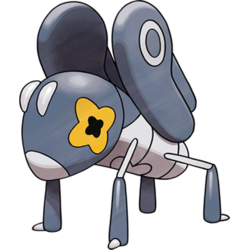From Bulbapedia, the community-driven Pokémon encyclopedia.

|
The subject of this article is a Pokémon which has recently been announced.
This article's contents will change as more information becomes available, perhaps abruptly. Please be cautious when adding information to this article, as rumors and speculation can often be confused with facts. Avoid any information on this subject which is not confirmed by reliable sources.
|
Nymble (Japanese: マメバッタ Mamebatta) is a Bug-type Pokémon introduced in Generation IX.
It evolves into Lokix starting at level 24.
Biology
Nymble is a gray, oblong, insectoid Pokémon resembling a grasshopper, with dark gray colorations on its face, back, and legs. Its head has two stubby semicircular antennae, a circle on its snout resembling a mouth or nose, and yellow compound eyes shaped like rounded crosses, complete with cross-shaped black pupils. Its body is divided by lines into multiple segments, and it has an X-shaped pattern on its underside. It has six legs: two pairs of legs are located on the sides of its body, and each of the forelimbs are dark gray and contain a single claw. The third pair of legs is located above its body and is much larger; they are oblong in shape and solid dark gray in color, with light gray ring patterns over the joints. Nymble always keeps its third set of legs folded up.
When threatened, Nymble can jump to a height of over 30 feet (10 meters). Its jumping capabilities allow it to dodge attacks while dealing damage.
In the anime
Major appearances
Minor appearances
In the manga
In the TCG
- Main article: Nymble (TCG)
Game data
Pokédex entries
| This Pokémon was unavailable prior to Generation IX.
|
| Generation IX
|
|
|
Paldea
#14
|
| Scarlet
|
It has its third set of legs folded up. When it’s in a tough spot, this Pokémon jumps over 30 feet using the strength of its legs.
|
| Violet
|
It's highly skilled at a fighting style in which it uses its jumping capabilities to dodge incoming attacks while also dealing damage to opponents.
|
|
|
Game locations
| This Pokémon was unavailable prior to Generation IX.
|
|
|
In side games
Held items
Stats
Base stats
| Stat
|
Range
|
| At Lv. 50
|
At Lv. 100
|
33
|
|
93 - 140
|
176 - 270
|
46
|
|
45 - 107
|
87 - 210
|
40
|
|
40 - 101
|
76 - 196
|
21
|
|
23 - 80
|
42 - 155
|
25
|
|
27 - 84
|
49 - 163
|
45
|
|
45 - 106
|
85 - 207
|
Total: 210
|
Other Pokémon with this total
|
- Minimum stats are calculated with 0 EVs, IVs of 0, and (if applicable) a hindering nature.
- Maximum stats are calculated with 252 EVs, IVs of 31, and (if applicable) a helpful nature.
|
Type effectiveness
| Under normal battle conditions in Generation IX, this Pokémon is:
|
|
|
|
|
|
|
|
|
|
|
|
|
Learnset
|
|
|
|
- Bold indicates a move that gets STAB when used by Nymble
- Italic indicates a move that gets STAB only when used by an Evolution of Nymble
|
|
|
|
|
- Bold indicates a move that gets STAB when used by Nymble
- Italic indicates a move that gets STAB only when used by an Evolution or an alternate form of Nymble
|
|
|
|
|
- Moves marked with an asterisk (*) must be chain bred onto Nymble
- Bold indicates a move that gets STAB when used by Nymble
- Italic indicates a move that gets STAB only when used by an Evolution of Nymble
|
Side game data
Evolution
Sprites
Trivia
Origin
Nymble appears to be based on a grasshopper. The fact that it cannot fly, unlike most grasshoppers, may suggest it is based on a meadow grasshopper, or a grasshopper in its nymph stage, which is alluded to in its English name. The way its third set of legs fold up resembles pocket knives.
Name origin
Nymble may be a combination of nymph (immature form of an insect) and nimble.
Mamebatta may be a combination of 豆 mame (prefix for small) and 飛蝗 batta (locust; grasshopper).
In other languages
| Language
|
Title
|
Meaning
|
 Japanese Japanese
|
マメバッタ Mamebatta
|
From 豆 mame and 飛蝗 batta
|
 French French
|
Lilliterelle
|
From lilliputien and sauterelle
|
 Spanish Spanish
|
Nymble
|
Same as English name
|
 German German
|
Micrick
|
From mickrig and cricket
|
 Italian Italian
|
Nymble
|
Same as English name
|
 Korean Korean
|
콩알뚜기 Kong-alttugi
|
From 콩알 kong-al and 메뚜기 mettugi
|
 Mandarin Chinese Mandarin Chinese
|
豆蟋蟀 Dòuxīshuài
|
From 豆 dòu, 蟋蟀 xīshuài
|
 Cantonese Chinese Cantonese Chinese
|
豆蟋蟀 Dauhsīksēut
|
From 豆 dauh, 蟋蟀 sīksēut
|
|
|
|
|
|
|
|
Related articles
External links

|
This Pokémon article is part of Project Pokédex, a Bulbapedia project that aims to write comprehensive articles on each Pokémon species, as well as Pokémon groups and forms.
|





